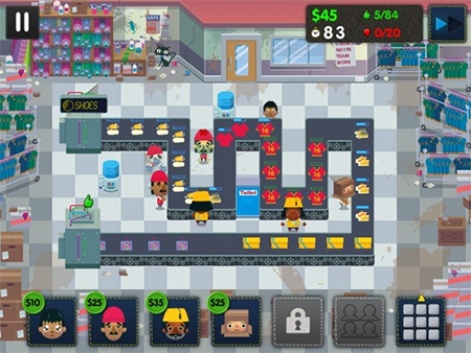The recent news of Sweatshop HD being pulled from the App Store and the odd attitude Apple seems to display about games has occupied my thoughts over the last couple of weeks for personal and professional reasons.
Putting my personal hat on, Sweatshop HD was the first game I commissioned at Channel 4 Education, and it was a game of which I was most proud.
The Littleloud team were a dream to work with and I remember the long conversations with the Channel 4 lawyers about the subject matter (we had put a call out for ideas on ethical fashion), some of the scripting, taste and decency and whether we could get away with 'Crymark'.
The lawyers became my best friends because they realised that, in order to appeal to 14 year olds and provoke them into thinking about things in a different yet subtle way, it had to be edgy and funny.
Taking care
Above all, the game had to be careful not to make a judgement or take any position about the rights and wrongs of sweatshops and child labour.
Instead, it has to cleverly use game mechanics and humour to show players the consequences of their actions and decisions they made, and to elicit some empathy.

Sweatshop HD
It was through the doing of the game that enlightenment came. And that's what games are really, really good at and it's exactly what we should be protecting.
I just had to look at the comments on the Sweatshop HD reviews to know that the game had done its job.
Winds of change
I have come away from a phenomenal week at GDC with an acute sense that many unhappy and sometimes angry voices in the industry are finally cutting through.
There is acute dissatisfaction at the media and some policy makers' attitude towards the place of the industry in our cultural landscape as well as anger about sexism, racism, homophobia and lazy stereotypes.
This anger is shaping the future of what we do, who we do it for and our public image.
It's as if we have left our spotty teen years behind and have suddenly realised we have a legitimate place in the world that needs to be acknowledged and respected.
I am in this job because I believe that our industry should be treated in the way that the US Supreme Court of Justice declared it should be two years ago: as a powerful art form and a key part of our entertainment culture that should be protected.
Writing about that particular decision, Justice Antonin Scalia said that:
"Like the protected books, plays and movies that preceded them, video games communicate ideas and even social messages through many familiar literary devices (such as characters, dialogue, plot, and music) and through features distinctive to the medium (such as the player's interaction with the virtual world) That suffices to confer First Amendment protection."
Massively multiplayer
I may have been especially sensitive to this sense of anger because I chose to go to particular sessions that were relevant to me as someone whose job it is to promote and advocate on behalf of the industry to decision makers, to the media and to consumers.
As Colleen Macklin and John Sharp said in their Education Summit session about throwing out old game design rules in education, the general public may not self-subscribe to some stereotypical subset of humanity called 'gamers', but we are all players. Every single human.
Play has and always will be how we make sense of the world around us. Play can be subversive, it can be frivolous, it can be escapist, it can help you learn, it can help you contemplate, it can help you question.
Now, I'm not going to comment on Apple's stance the curation of apps and games. However, we must remember what we are doing when we make a game.
In the process of making games, we are mistaken if we think we create them in a vacuum, that we leave ourselves outside of the creative process. Programmers, artists, writers, designers all leave a bit of themselves in their creations.
The act of making in itself is a way of understanding and a form of thinking that helps us as humans to answer and ask questions that cannot always be answered or asked through words (books) or images (movies) alone.
Making is one of the deepest investigations into what it is to be human and play helps to open our minds to different ways of doing and understanding.
Doing words
The end result of this creative process is the game, but they are not some empty object ready to 'be played'.
They are a verb. Games do they generate culture, they generate emotion and opinions, and they don't need the label 'serious' to do this.
This was demonstrated beautifully and emotionally by Vanda Caballero, the former triple-A developer turned indie maker who created the title I most wanted to play this week, Papa y Yo.
For a long time, he had been frustrated at how the industry had become very adept at pushing the boundaries around fear, ecstasy and rage but sucked at empathy.
As storytellers, he said in his emotional GDC session, our job is to use this newish digital medium of simulation to tell stories. He told a very personal story of his abusive alcoholic father through his PS3 game, using the metaphor of a boy and his relationship with a monster addicted to green frogs.
The more I heard about this game over the course of the week, the more I wondered where the 'line' would be for Apple.
In his piece on Sweatshop HD, Simon Parkin, who worked on the game, expressed his "infuriation" at the industry being compelled to deploy labels like 'serious' or even 'educational' to artificially distinguish between games that set out to make a point, and games that apparently don't.
Take cover
As UKIE, we are here to be your human shield, to amplify your voices, to be the funnel to the media, to the decision makers, to those who seek to suppress our art form.
We are all in the business of fun, engagement and entertainment, and we should all be in the business of protecting our right to make any game with any message we want, whatever the message.
It's called freedom of expression, and we are one of the most unique expressive art forms the world has ever experienced. Let's be proud of that and stand by it.
To find out more about UKIE, including membership details, visit the association's website.























